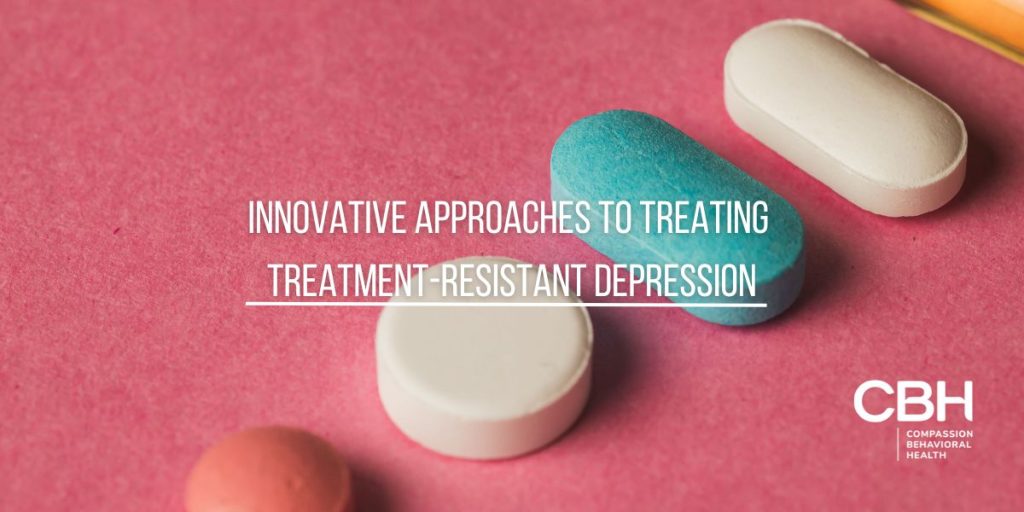Treatment-resistant depression (TRD) poses significant challenges to both patients and healthcare providers due to its stubborn nature. Traditional therapies often fall short, leading to a growing interest in innovative approaches that promise better outcomes. This article explores the nature of TRD, traditional treatment methods, emerging therapies, and the future landscape of mental health care.
Understanding Treatment-Resistant Depression
Treatment-resistant depression refers to cases where individuals do not respond to standard treatments for depression, such as multiple combinations of psychotherapy and medication. This condition affects a substantial portion of the population, highlighting the necessity for new strategies in management and care.
Defining Treatment-Resistant Depression
TRD is generally defined as a failure to achieve a satisfactory response to at least two antidepressant treatments of adequate dose and duration. This can lead to an ongoing cycle of hopelessness and a decline in overall quality of life. Understanding this definition is critical for clinicians to identify patients who may require alternative treatment options.
The Prevalence and Impact of Treatment-Resistant Depression
The prevalence of TRD is estimated to affect 30-40% of individuals diagnosed with major depressive disorder. The impact is profound, not just on mental health, but also socially and economically:
- Increased healthcare costs due to frequent doctor visits and attempts at different therapies.
- Loss of productivity in workplaces, affecting both individuals and organizations.
- Strained personal relationships, as individuals may struggle to engage with loved ones.
Beyond these immediate effects, the long-term consequences of TRD can be devastating. Individuals may experience a persistent sense of isolation and despair, which can exacerbate feelings of inadequacy and worthlessness. This emotional turmoil can lead to an increased risk of self-harm or suicidal ideation, making it imperative for healthcare providers to adopt a proactive approach in managing TRD. Furthermore, the stigma surrounding mental health issues can prevent individuals from seeking help, compounding the problem and leading to a cycle of untreated symptoms.
In response to the challenges posed by TRD, researchers are exploring innovative treatment modalities, including neuromodulation techniques such as transcranial magnetic stimulation (TMS) and ketamine infusions. These approaches aim to target the brain’s neurochemical pathways in ways that traditional antidepressants may not. Additionally, there is a growing recognition of the importance of personalized medicine, where treatment plans are tailored to the individual’s unique genetic makeup and response patterns, potentially improving outcomes for those who have struggled with conventional therapies.
The Traditional Methods of Treating Depression
Most cases of depression are treated using a combination of psychotherapy and medications. While these methods can be effective for many, they often leave a significant number behind, especially those with TRD.

Psychotherapy and its Limitations
Psychotherapy, also known as talk therapy, can provide valuable insights and coping strategies for managing depression. However, several limitations exist:
- Not all patients respond positively to talk therapy.
- Therapeutic benefits can take time to materialize, leaving some patients feeling frustrated.
- Access to qualified therapists may be limited, especially in rural or underserved areas.
Additionally, the effectiveness of psychotherapy can be influenced by the therapeutic relationship between the patient and the therapist. A lack of rapport can hinder progress, making it crucial for patients to find a therapist with whom they feel comfortable. Moreover, certain types of therapy may not resonate with everyone; for instance, cognitive-behavioral therapy (CBT) may be effective for some but not for others who might benefit more from approaches like dialectical behavior therapy (DBT) or interpersonal therapy (IPT). This variability underscores the necessity for a personalized approach to treatment, which can be challenging to achieve in traditional settings.
Medication and its Shortcomings

Antidepressant medications are often the first line of defense against depression. However, many patients will find themselves on a medication merry-go-round:
- Side effects that detract from the quality of life.
- Need for trial and error to find the right medication, delaying recovery.
- Addressing the risk of dependency and withdrawal symptoms.
Furthermore, the biological mechanisms of depression are complex and not fully understood, which complicates the development of effective medications. For some individuals, the neurotransmitter imbalances that antidepressants aim to correct may not be the sole issue, as factors like hormonal changes, chronic stress, and lifestyle choices also play significant roles. This complexity can lead to a frustrating experience for patients who may feel like they are navigating a labyrinth without a clear exit. Additionally, the stigma surrounding mental health can deter individuals from seeking medication, leading them to suffer in silence rather than exploring all available treatment options.
The Emergence of Innovative Treatment Approaches
As challenges with traditional treatments grow, so does interest in innovative therapies for treatment-resistant depression. These new methods often leverage advancements in technology and personalized medicine.
The Role of Technology in Depression Treatment
Technology has revolutionized many fields, and mental health care is no exception. Various tools and platforms are emerging to provide support for individuals with TRD:
- Mobile apps offering cognitive-behavioral therapy techniques and mood tracking.
- Teletherapy and online counseling that broaden access to mental health professionals.
- Wearable devices that monitor physiological signs related to mood changes.
In addition to these tools, virtual reality (VR) is becoming an exciting frontier in mental health treatment. VR can simulate environments that help patients confront their fears or practice coping strategies in a controlled setting. This immersive experience can be particularly beneficial for those who find it difficult to engage in traditional therapy settings. Furthermore, artificial intelligence (AI) is being integrated into treatment plans, providing personalized recommendations based on real-time data collected from users, thereby enhancing the therapeutic experience.
The Shift Towards Personalized Medicine

Personalized medicine aims to tailor treatment plans to individual patient profiles, including genetic factors, lifestyle, and personal preferences. This approach can lead to:
- More effective treatment with fewer side effects.
- Increased patient engagement and adherence to treatment.
- A broader understanding of the biological bases of depression.
As research in genomics progresses, the potential for pharmacogenomics—where a patient’s genetic makeup influences their response to medications—becomes increasingly viable. This could allow clinicians to prescribe the most effective antidepressant from the outset, minimizing the trial-and-error process that often accompanies treatment for depression. Additionally, integrating lifestyle factors such as diet, exercise, and sleep patterns into personalized treatment plans can further enhance outcomes, as these elements significantly impact mental health. The convergence of these innovative approaches not only holds promise for those suffering from treatment-resistant depression but also paves the way for a more holistic understanding of mental health care.
Exploring Specific Innovative Approaches
Within the realm of innovative therapies, several specific treatments are gaining traction among clinicians and researchers. As the landscape of mental health treatment evolves, these approaches are not only reshaping how we understand and treat conditions like depression but also challenging long-held beliefs about the efficacy and safety of various interventions.

Neuromodulation Techniques
Neuromodulation encompasses a range of interventions that can alter nerve activity through targeted delivery of a stimulus. Two notable examples are:
- Transcranial magnetic stimulation (TMS): This non-invasive procedure uses magnetic fields to stimulate nerve cells in the brain, showing promise in reducing symptoms of TRD.
- Electroconvulsive therapy (ECT): Though traditionally seen as a last-resort treatment, recent advances have made ECT more acceptable and beneficial for those with severe depression.
Beyond these, researchers are exploring additional neuromodulation techniques such as deep brain stimulation (DBS), which involves implanting electrodes in specific brain regions to regulate abnormal impulses. This method has shown potential for treatment-resistant depression and obsessive-compulsive disorder, providing hope for patients who have not responded to conventional therapies. Furthermore, the ongoing development of personalized neuromodulation strategies aims to tailor interventions based on individual brain activity patterns, potentially enhancing treatment efficacy and minimizing side effects.
Ketamine and Other Novel Drug Therapies
Ketamine, originally an anesthetic, has garnered attention for its rapid antidepressant effects. Unlike typical antidepressant medications, ketamine can provide relief within hours:
- It is administered intravenously or as a nasal spray.
- Research shows that it can significantly reduce suicidal ideations.
- Other novel drug therapies include psilocybin and other psychedelics, which are currently being studied for their therapeutic potential.
In addition to ketamine, the exploration of psychedelic compounds such as MDMA and ayahuasca is gaining momentum in clinical trials. These substances, once stigmatized, are now being recognized for their ability to facilitate profound emotional experiences and promote neuroplasticity. Early studies suggest that when combined with psychotherapy, these psychedelics can lead to significant improvements in mood and emotional regulation. As researchers continue to investigate the mechanisms behind these effects, the potential for integrating such therapies into mainstream mental health treatment is becoming increasingly plausible, offering new avenues for those suffering from chronic mental health conditions.
The Future of Depression Treatment
As research in the field of mental health continues to advance, the prospects for treating treatment-resistant depression are becoming increasingly optimistic.
The Potential of Genomic Medicine
Genomic medicine involves using genetic information to guide treatment decisions. It holds the potential to:
- Identify individuals at risk of developing TRD.
- Personalize medication choices based on genetic variations that affect drug metabolism.
- Offer insights into new therapeutic targets based on genetic insights into depression.
Furthermore, the integration of genomic data with other biological markers could lead to a more comprehensive understanding of how depression manifests in different individuals. For instance, researchers are investigating the role of epigenetics—how environmental factors can influence gene expression—in the development of TRD. This could open up avenues for preventative strategies that not only focus on genetic predispositions but also consider lifestyle and environmental modifications that could mitigate risks.
The Promise of Virtual Reality and AI in Mental Health Care
The utilization of virtual reality (VR) and artificial intelligence (AI) in mental health is only beginning to be understood. These technologies can offer immersive experiences in therapy and enhance treatment options:
- AI can help analyze individual patient data to recommend tailored treatment strategies.
- VR can serve as a tool for exposure therapy, helping patients confront and manage their triggers in a controlled environment.
- This technology can also assist in skill-building exercises to promote coping strategies.
Additionally, the potential for AI to facilitate real-time monitoring of patients’ mental health through wearable devices is an exciting frontier. These devices can track physiological responses, such as heart rate and sleep patterns, which may correlate with mood changes. By analyzing this data, AI systems could alert healthcare providers to significant shifts in a patient’s condition, allowing for timely interventions. Moreover, VR experiences can be designed to adapt based on the user’s responses, creating a dynamic therapeutic environment that evolves with the patient’s progress.
In summary, the landscape of treatment-resistant depression is evolving rapidly as researchers and clinicians explore innovative and personalized treatment approaches. By understanding TRD and leveraging new technologies, there is hope for better outcomes and brighter futures for individuals grappling with this challenging condition.
Get help with treatment-resistant depression at CBH in Florida

If you or a loved one is facing the challenges of treatment-resistant depression, know that you are not alone. At Compassion Behavioral Health, we understand the complexity of this condition and are committed to providing innovative and personalized care. Our specialized team in South Florida is ready to offer you a customized approach to mental health and substance use treatment, ensuring a path to long-term, sustainable recovery. Don’t let distance be a barrier; our Hollywood rehab center is conveniently located near major airports and serene beaches, providing a nurturing environment for healing. Call Us Today and take the first step towards reclaiming your life with the support and guidance you deserve.



